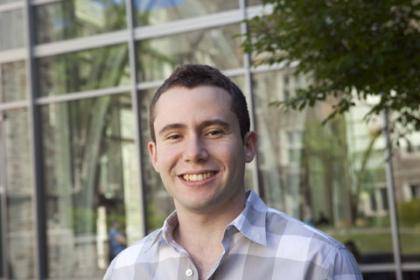
Ask Alex Beutel how to succeed at Duke, and he'll likely tell you to take fewer notes and do more hack-a-thons and other campus community activities.
A person who wants to "make things happen," Beutel doesn't see a whole lot of value in traditional college lectures.
Instead, he takes his lessons from life's frustrations and from the professors and classmates who challenge him.
Beutel is graduating with a dual degree in computer science and physics and won best paper at the 18th annual ACM SIGSPATIAL International Conference on Advances in Geographic Information Systems in November 2010.
He says one of the frustrations that taught him well was ACES, the Automated Computer Enrollment System students use to register for classes. The university upgraded the system in 2008 and on the morning the web application was released, Beutel was excited to check out the new features.
But, after logging on, he was disappointed to find the "improved" pages "a mess and essentially unusable," he says.
Beutel was not the only student dissatisfied with the system. Within 24 hours of the new ACES release, students were posting their opinions on Facebook, creating an anti-ACES Facebook group and e-mailing the registrar. The outcry was so great that Beutel and other students felt compelled to brainstorm and build alternative web sites.
Beutel's site was everything he and co-designer Nick Bottenus, also a Duke senior, had set out to make it: fast, user-friendly and useful. Yet it too failed, at first.
The site was too simple and was easily superseded by another student's site, Beutel says, adding that the experience was one of his best lessons. The setback forced him to perform real-world, on-the-fly problem-solving and also to learn to communicate with other computer programmers as well as with his "clients," fellow Duke students who didn't program but wanted a better application.
Through these conversations, Beutel and his friends designed the Schedulator. This site met and eventually exceeded expectations to the point where "half to two-thirds of Duke students, including a large majority of Pratt engineers" now use it to pick their classes, Beutel says. The site features a weekly calendar that shows how classes fit together and now lets students shop for the lowest-priced textbooks for each course they enter in their schedule.
Yet, even with the Schedulator experience, working to build the Duke Chronicle's online presence and writing code for physics researchers studying elusive particles called neutrinos, Beutel wasn't satisfied with merely programming computers. He wanted to test their limits. He wanted to go into a project and not necessarily know the outcome, and he wanted his code to be innovative and to make a difference.
This was at the beginning of Beutel's junior year, and he had just enrolled in Design and Analysis of Algorithms taught by Duke computer scientist Pankaj Agarwal.
Beutel was one of only three undergraduates among the handful of graduate students in the course. But, being competitive, he wasn't going to let his age prevent him from showing Agarwal he was a sharp, creative student with extraordinary skill in computing.
Agarwal easily recognized Beutel's potential and together with the help of postdoc Thomas Moelhave, the team tried to open the bottleneck between incoming terrain data and the resulting high-resolution land maps that could be made with that information.
Beutel explains that the data -- high-resolution scans of the terrain -- from planes equipped with sophisticated, laser-based tools, is more easily available than ever. The data influx leaves scientists scrambling to quickly process the information and create accurate, high-resolution 3-D maps that model the terrain.
In the past, processing such large amounts of data on a large scale was extremely slow. But, after several months of algorithm analysis, coding and optimizing bottlenecks, Beutel, Moelhave and Agarwal created an algorithm that cut the production time for one of these 3-D terrain maps to one-tenth of the older systems. It was this work that earned the group best paper award at a major, international GIS conference in November.
Agarwal says Beutel was " critical to the success of this work," mainly because of his mathematical and analytical skills, which are far beyond those of an average computer student.
Beutel says the research experience showed him there was more to computer science than programming. He is now interested to see how other scientists use the new algorithm in ways far beyond what he can currently imagine. Though he most likely won't continue his current research project, Beutel says he will continue to study algorithmic research, " hopefully with interesting applications to real world problems," when he heads to Carnegie Mellon next year to begin a Ph.D. program in computer science.